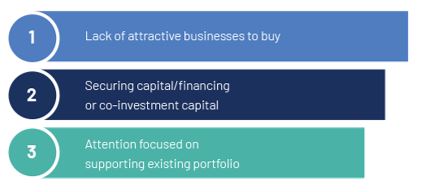
What’s on the horizon for capital markets dealmaking for the remainder of 2020 and beyond? To find out, we issued our inaugural Dealmaker Pulse survey during the last week of April – right as we were all grasping for answers in the COVID-19 madness. We invited our global network of private equity investors to participate in this survey – and we heard from a mix of both clients and non-clients. In an effort to get the best and most accurate intelligence, we kept all responses anonymous.
We wanted to gauge the trends and issues in the market and how capital markets dealmaking would be affected, since, as we all know, the reality on the ground has changed so dramatically since March. Moving forward, the survey will be issued every 6 months. We will continue to focus the survey on overall market sentiment, deals, industry best practices, and technology. We will continue to host webinars that focus on these topics, as well.
Those interested in accessing the full report – which comes packed with data-driven insights specifically for private equity, investment banking, and credit firms – should click here to download their copy. For those short on time, see below the five biggest trends we’re monitoring that have the potential to hugely impact the capital markets industry, according to the report.

- A lack of attractive businesses to buy
We asked private equity professionals what their biggest challenges to execute on their investment strategies were, and the above were listed as the top three answers. Investors are worried about putting their dry powder to work through both platform investments and add-ons for their portfolio companies. With already-fierce competition, it appears that the market may witness some fatigue among deal professionals who are working harder than ever to originate deals and get them over the finish line.

- COVID-19 and disruptions to the portfolio
Private equity investors report a high level of confidence in the management teams embedded at their portfolio companies. Despite market dislocations and disruption caused by COVID-19, very few report concerns about their leadership’s ability to navigate uncertainty around tax and regulatory environments, reorganizations, downsizing, or adjusting to the new normal. In this way, capital markets dealmaking may make a return to normalcy prior to other industries hard-hit by COVID-19.

- A growing reliance on intermediaries and intermediated deals
No, the “proprietary deal” isn’t completely dead – it’s just going to be nearly impossible to find. Investment bankers and advisors have long been viewed as the glue holding the M&A market together. Based on the results of this survey, that doesn’t appear likely to change. In fact, the market’s growing reliance on intermediaries is poised to increase further because the vast majority of private equity investors are worried about their ability to access quality investment opportunities.

- The recap market is heating up
Put simply: our survey found that investors are worried about liquidity. They are insecure in their ability to securing financing and co-investment. Those that responding agreed that deals will come in the form of corporate carve-outs and recapitalizations.

- Striking a balance between new platform deals and time spent with the portfolio isn’t getting any easier
This trend – investors being torn between spending time improving the existing companies in the portfolio versus time spent closing new deals – is not necessarily news, but it’s noteworthy that these struggles are not going away. If acquisitions or roll-ups are the goal for any firm that has successfully mitigated the current market risks, dealmakers may need supplemental resources to support their deal pipeline, strengthen relationships with intermediaries, and manage portfolio operations. These efforts will help them win in what is shaping up to be a hyper-competitive deal environment.
Be sure to download the full Spring 2020 Dealmaker Pulse report. See below for a recent video interview between DealCloud’s Ben Harrison and ACG GrowthTV’s Kathryn Mulligan where they discuss the survey results in more detail:
